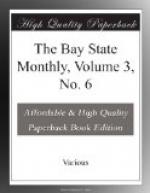“The County Court held at Hampton, ye 13th of ye 8th month 1668, Mr. Edward Goodwin being presented by ye Selectmen of ye town of Amesbury to Court to keep ye Ferry over Merrimac river about ye mouth of ye Powow river where ye said Goodwin now dwelleth, the Court do allow and approve of ye sd person for one year next following and until ye Court shall take further orders therein, and ye prices to be as followeth so, for every single passenger two pence, for a horse and man six pence, and for all great cattle four pence, for sheep and other small cattle under two years old two pence per head.”
In 1791 there came up a question of a bridge being built across the Merrimac. A town meeting was called to oppose the measure, and in this it was argued that a bridge would throw into disuse the ferry with which much pains had been taken. Precious old fogies! In those days, too, they lived, for they were as old as the centuries. Nothing of the mushroom about them. There is a tradition that once in Revolutionary days, Washington was carried across this ferry. But it is impossible to say what the tradition is founded upon, and how much it is worth.
As to the river, there are rivers and rivers, as the saying is; at some we marvel, some we fear and to some we make pilgrimages as to the Mecca of the faithful. But the Merrimac is a river to be loved, and to be loved the better the more familiar it is. What its poet, Whittier, says about it must be literally true:
“Our river by its valley born
Was never yet forgotten.”
It is worth while to try to imagine it as he writes it in “Cobbler Keezer’s Vision” two hundred and more years ago, when that old fellow was so amazed at the prospect of mirth and pleasure among the descendants of the stern Puritans that he dropped his lapstone into the water in bewilderment.
This was the time when
“Woodsy and wild and lonesome,
The swift stream wound away,
Through birches and scarlet maples
Flashing in foam and spray.”
“Down on the sharp-horned ledges
Plunging in steep cascade,
Tossing its white-maned waters
Against the hemlock’s
shade.”
“Woodsy and wild and lonesome,
East and west and north and
south;
Only the village of fishers
Down at the river’s
mouth;”
“Only here and there a clearing,
With its farm-house rude and
new,
And tree-stumps, swart as Indians,
Where the scanty harvest grew.”
What a picture that is! And then behind these tree-stumps, the great forest with its possibilities of comfort and even of competence in its giant timbers,—when they were fairly floored, but; as it stood, a threatening foe with a worse enemy in its depths than the darkness of its shadows, or the wild beasts.




